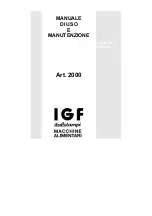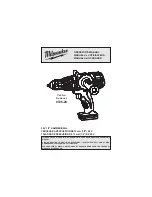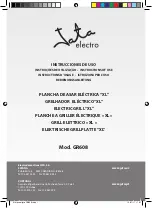
7
Drilling
DRILLING METALS
• Always clamp sheet metal.
• Support thin metal with a block of wood to avoid distorting it.
• Use a punch to mark the centre of the hole.
• Use a suitable lubricant for the material you are
working on.
USE:
FOR:
Oil
Steel
Turpentine or paraffin
Aluminum
Do not lubricate
Brass, copper or cast iron
DRILLING PLASTICS AND PLASTIC COATED CHIPBOARD
• Use high-speed drill bits
• See “Drilling wood” below
DRILLING MASONRY
This drill is not designed for drilling masonry. Purchase or
rent a hammer drill.
DRILLING WOOD
• Clamp a piece of scrap wood to the back of your work to
prevent splintering.
ALL DRILLING OPERATIONS
• Mark off the centre of the hole using a centre punch or nail.
• Don’t force the drill, let it work at its own pace.
• Keep the drill bit sharp.
• Reduce pressure as the drill is about to break through the
item being drilled.
WARNING!
Be prepared for binding when the bit
breaks through the workpiece, because the drill has a
tendency to grab and kick opposite to the direction of
rotation, which could cause a loss of control. If the operator
is not prepared, this loss of control could result in serious
injury.
General safety instructions for handling
power tools (European locations)
WARNING:
Read all safety warnings and all instructions.
Failure to follow the warnings and instructions may result in
electric shock, fire and/or serious injury.
This unit may not be used by people (including children) with reduced
physical, sensory or mental capacities, with a lack of experience and
without the appropriate knowledge, unless they are supervised by
someone who is responsible for their safety or have been instructed by
such a person with regard to how the unit is to be operated.
Children should be supervised to ensure that they do not play with the
device.
Save all warnings and instructions for
future reference
1). WORK AREA SAFETY
• Keep work area clean and well lit. Cluttered or dark areas invite
accidents. Rags, cloths, cord, string and similar items should never
be left around the work area
• Do not operate power tools in explosive environments, such as in
the presence of flammable liquids, gases, or dust. Power tools create
sparks, which may ignite the dust or fumes.
• Keep children and bystanders away while operating a power tool.
Distractions can cause the operator to lose control.
2). ELECTRICAL SAFETY
• Power tool plugs must match the outlet. Never modify the plug in
any way. Do not use any adapter plugs with grounded power tools.
Unmodified plugs and matching outlets will reduce risk of electric
shock.
• Avoid body contact with grounded surfaces such as pipes, radiators,
ranges and refrigerators. There is increased risk of electric shock if
your body is grounded.
• Do not expose power tools to rain or wet conditions. Water entering a
power tool will increase the risk of electric shock.
• Do not abuse the cord. Never use the cord for carrying, pulling or
unplugging the power tool. Keep cord away from heat, oil, sharp
edges or moving parts. Replace damaged cords immediately.
Damaged or entangled cords increase the risk of electric shock.
Touch_IM_ED8.indd 7
22/10/13 4:39:56 PM


































